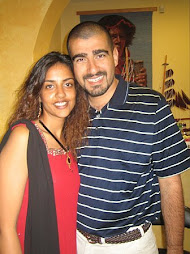Yunus is an economics professor turned banker to the poor. His moment of inspiration came decades ago when Bangladesh was in a famine and the economic theories of the West, that he was teaching, which were supposed to bring prosperity seemed to be lacking in effectiveness in Bangladesh. He recounts his first loan of $27 to a village of poor people who were caught up in a borrowing cycle caused by one of the local loan sharks. He loaned them $27 at no interest to get them out of the cycle.
I could immediately sympathize with this unfortunate situation having watched "pay day" check advance loan companies grow in Canada over the past decade. In Canada it is a federal crime to charge more than 60% per year interest. Yet these payday loan companies have been charging several hundred percent interest. These companies are now under legal scrutiny in Canada. If this type of wrong doing can be perpetrated in Canada imagine what happens in the 'third world'. Loan sharks prey on the poor and nobody steps in to intervene. Well, in Bangladesh Muhammed Yunus stepped in to provide an alternative.
Low cost loans to the poor. A 20% or 30% interest rate may seem high to many in the industrialized world but that's a great bargain when you are borrowing a small amount and have no collateral and no other access to capital.
After convincing the government Yunus was able to setup Grameen Bank as a social business. A social business as defined by Yunus is basically a profit seeking business that pays no dividends to shareholders and it's main priority is to effect social change in the area within which it operates. Social businesses can have investors but the investors can recoup their initial investment and nothing more. A social business seeks profit only to be self sustaining and to expand it's social good. He contrasts this with traditional businesses by calling them "profit maximizing businesses".
Grameen Bank, as one of the world's first examples of a social business, has learned many things by experience. One of those important lessons is to use community organization as a means to improve the social condition of the poor. Not only do the poor need access to money from a bank in order to build a mini-business but they need moral and educational support from their peers.
In order to make long term improvements to the conditions of the poor, education and lifestyle changes need to be made. Through several iterations Grameen Bank has developed the following Sixteen Decisions which borrowers voluntarily agree to abide by to help further the social goals of lifting the community out of poverty.
The Sixteen Decisions:
- The four principles of Grameen Bank --Discipline, Unity, Courage, and Hard Work-- we shall follow and advance in all walks of our lives.
- We shall bring prosperity to our families.
- We shall not live in dilapidated houses. We shall repair our houses and work towards constructing of new houses as soon as possible.
- We shall grow vegetables all the year round. We shall eat plenty of them and sell the surplus.
- During the plantation season, we shall plant as many seedlings as possible.
- We shall plan to keep our families small. We shall minimize our expenditures. We shall look after our health.
- We shall educate our children and ensure that they can earn to pay for their education.
- We shall always keep our children and the environment clean.
- We shall build and use pit latrines.
- We shall boil water before drinking or use alum to purify it. We shall use pitcher filters to remove arsenic.
- We shall not take any dowry at our sons' weddings; neither shall we give any dowry in our daughters' weddings. We shall keep the center free from the curse of dowry. We shall not practice child marriage.
- We shall not inflict any injustice on anyone; neither shall we allow anyone to do so.
- For higher income we shall collectively undertake bigger investments.
- We shall always be ready to help each other. If anyone is in difficulty, we shall all help.
- If we come to know of any breach of discipline in any center, we shall all go there and help restore discipline.
- We shall take part in all social activities collectively.
Maybe for a North American or a European these values may seem self-evident but for people living in poverty within Islam the principles above are in drastic need of being spread. You could think of these Sixteen Decision as the "prosperity memes".
I think it's great that Yunus has devised a voluntary system where people are choosing to educate their children, live environmentally sound and care for their community. The dowry system alone is known to be harmful to the poor because a family may have to give away their life savings to get their daughter married. Also, child marriage is a huge violation of human rights and in many muslim countries girls are married off as young as nine. It's brilliant that Grameen Bank is asking the women who borrow money not to hurt their daughters in this way by marrying them off young. This type of change from within has been lacking in the muslim world and it's a ray of hope to see that the rate of children being educated going up and the number of children per family going down since the time Grameen Bank has been operating in Bangladesh.
Yunus mentioned in his book that the Bank focuses on loaning to women because men are more likely to spend their profits on themselves than on their family. Women are more inclined to spend on their children and by having a set of decisions they have agreed to for the betterment of their community they can more easily get their husbands on board with their spending choices. This also gives women an important status in the family which is severely lacking under Islamic law (women generally have half the rights of men).
Yunus has created and inspired many other social businesses and is a testament to how one person can change the world!







